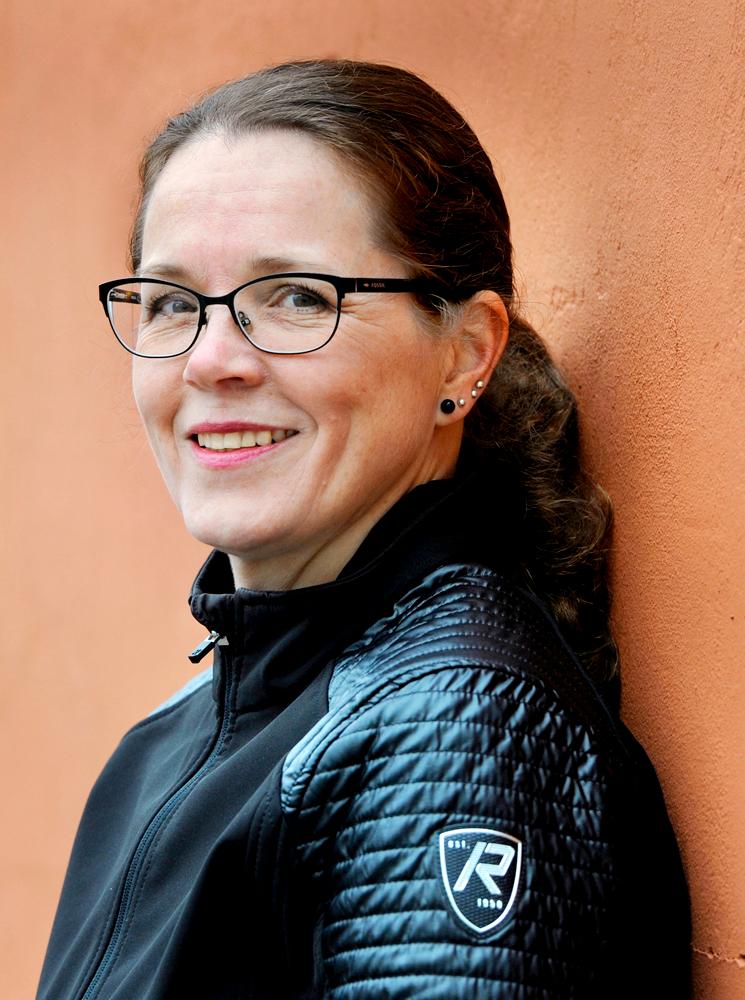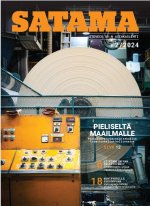High-Quality Protection for High-Quality Product

Owens Corning's high-strength polypropylene based coated woven protects the sawn timber leaving Finnish sawmills for customers around the world. Advance planning and a smooth supply chain guarantee timely deliveries to sawmills from Asia through the interim warehouse in Kotka.
The US-based Owens Corning acquired the Canadian company InterWrap in 2016, together with the story of how InterWrap's protective covers arrived in Finland. A sales rep for a Finnish sawmill had noticed in Japan that tattered wrapping did not give a good impression of high-quality sawn goods, even more so when next to them sat the packages of a Canadian competitor in tip-top shape. InterWrap's sales representative, Phil Flemming, offered woven coated fabric as the solution, and over time, Flemming and the fabric became a familiar sight at Finnish sawmills.
"Now, twenty years later, we deliver packaging material to Finland every week," says Jussi Posio, sales representative for Owens Corning. He started in his position last spring, working in the Nordic and Baltic countries.
Protection from moisture and UV radiation
The tattered wrappers of the story were made of polyethylene film, a good protection for many types of products. However, according to Posio the PE film as protection for sawn goods will be put to the test at the latest when the customer unloads the bundles from containers and stacks them outdoors. Sawn timber is threatened by both moisture and UV radiation.
"In PE film, even a small cut widens easily. Problems may also be caused by a small puncture that lets water in but not out," Posio says. He believes that by investing in the quality of the wrapping, sawmills could avoid many very expensive claims about the quality of the goods.
"On the US market, PE film is rarely used. Everyone demands coated wovens because the sawn goods bundles are transported in open railroad carriages and trucks. On top of that, the bundles are stored outdoors."
Durable hood over the timber bundle
Owens Corning's polypropylene based coated woven wrap comprises three polypropylene layers. Sandwiched between two smooth layers, there is a middle layer woven from flat plastic strips one-fifth of an inch wide.
"Even if the top layer is damaged, the weave and the bottom layer stay intact," Posio says. According to him, one of the benefits of the material is its ease of use. The fabric is seamed to a hood the size of a timber bundle at the factory. The hood is then drawn over the bundle and fastened with straps or staples.
"One customer may have dozens of hood sizes. The hood is like a tailored suit. It looks good and prevents wind from getting under it. Some customers use the wrapping as rolled goods."
Posio emphasizes the speed of packaging all the way to stapling as the fabric does not require strengthening under the staples.
Interim storage makes deliveries flexible
It is possible to manufacture transparent coated wovens, but Posio reveals that the most popular version is white, on which the customer logos are printed at the factory.

"Because the products are different for each customer and the factories are located in Asia, we pay a lot of attention to delivery security and speed. The delivery time of a direct order is in the region of 12 weeks, but with smart supply chain management, it is often possible to deliver in under a week," Posio says. By supply chain management, he means the customers anticipating their needs, and Owens Corning sending the material at the agreed intervals from Asia through Antwerp to Kotka. In Kotka, Steveco organizes the movement of the containers and takes care of the customs declarations. Steveco also unloads the containers and stores the products according to instructions by Owens Corning.
"When the material arrives to the warehouse, we don't necessarily know yet which sawmill will take the delivery, because the same company may have several sawmills. When an order comes in, we immediately pick the load for distribution," says Heli Korhonen, forwarding agent at Steveco.
Steveco forwarding team in close cooperation
Steveco's forwarding team works in close cooperation with the Owens Corning Service Center in Brussels, Belgium. The team at the Service Center takes care of orders, deliveries and invoicing.
"We have been working with them for many years, and everyone on both sides already knows each other," Korhonen says.
"We know how they want to operate and what they want from us. They can also rely on us keeping up to date on customs formalities and other official regulation, and we tell them if there's anything that might affect the import processes of Owens Corning," Mia Brunila, Sales Director, Steveco, confirms.
According to Jussi Posio, Owens Corning and Steveco have together developed the supply chain over the years while at the same time growing Owens Corning's business rapidly in Finland.
"The most important thing is that Steveco delivers the goods in time, undamaged, and in a way that is the most cost-efficient to our customers."
Focusing on wrapper recycling
It sometimes happens that a customer underestimates their need for wrapping material. The sawmill works at full speed, but the wrapping material printed with logos is running out.
"In the central distribution center in Antwerp, we always have some unprinted material available. We can quickly deliver it through Kotka to our customers," Posio says. He continues that Owens Corning supports its customers in matters related to recycling, in addition to recycling its own materials. The inner layer of the fabric is made of black, recycled polypropylene, and the two other layers of white virgin polypropylene, unless, for example, the customer wants the hood for their sawn timber to have transparent ends. In any case, the wrapping is suitable for mechanical plastic recycling without preprocessing, because all layers are the same type of plastic. In mechanical recycling, the material is ground and melted without separating the layers, and then reformed.
Packaging for metal products and geomembranes for earthwork
Posio says Owens Corning is aiming to continue growing its business in Europe, exemplified by his own job. He is the first local representative of packaging materials in Europe in the company's history. The more southern parts of Europe are still managed from North America.
"The sawmills already know us, but we also offer packaging materials for the metals industry, and our business is growing in both industries," he says. The company also uses its expertise in coated wovens in the development and manufacturing of geomembranes.
"Our geomembranes are used in many demanding earthwork applications, such as artificial ponds and mining industry pools. This is another strongly growing business area."
* * *
Owens Corning
- Established in the United States in 1935
- Produces insulation, covering, and composite materials for applications including construction, traffic and electronics, as well as energy generation
- Operates in 33 countries
- Employs approximately 20,000 people
- Annual net sales approximately USD 7.1 billion
- In 2016, acquired the Canadian company InterWrap, manufacturer of underlays and packaging materials
- In 2017, acquired the Finnish company Paroc, manufacturer of rock wool insulation
Text: Marianna Salin, photos Olli Urpela and Johannes Wiehn / Steveco SATAMA customer magazine
About Author

Satama
SATAMA is our customer magazine. it is published twice a year in Finnish.
